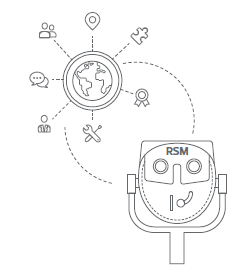The festive season is fast approaching, which also means changes in social security and tax laws as of January 1st, 2021.
In this article, we will review the consequences for individuals as of January 1st, but we will also develop the tax impacts of the particular year that was 2020. Indeed, we have seen our habits, particularly our work patterns, impacted or changed due to the health crisis, and this could have an impact on your tax obligations in 2021 regarding your 2020 income.
What will change on January 1st, 2021
Method of taxation
The new federal law on the reform of withholding tax on employment income will come into force on January 1st, 2021 and contains a whole series of new provisions that will directly affect foreign employees who do not hold a C permit.
Until then, the subsequent ordinary mainly concerned foreign taxpayers owning a Swiss real estate and/or subject to wealth tax. However, the conditions differed from canton to canton.
From now on, the reform provides for subsequent ordinary taxation for Swiss residents, taxed at source, who meet one of the following alternative conditions, applied consistently in the 26 cantons:
- Annual gross income exceeding CHF 120,000; or
- Income not subject to withholding tax; or
- Taxable wealth.
On the other hand, taxpayers subject to withholding tax and living in Switzerland will no longer be able to claim the deductions to which they were entitled until now via the tax at source correction form (2nd pillar buy-back contributions, 3rd pillar a contributions, childcare costs, alimony etc.). However, taxpayers will still be able to request a correction in very few cases, notably in the event of incorrect calculations of the gross salary taxed, or of the determining income for the tax rate, as well as in the event of incorrect application of the tax rate. Note that the withholding tax rectification procedure remains unchanged in 2021 for the 2020 tax period.
Cross-borders may opt for subsequent ordinary taxation, by means of a so-called “deemed-resident” tax return if they met the required conditions.
For further explanations, you can read our dedicated article on this subject.
We recommend that you take stock of your situation to determine whether you will have to file a declaration for the year 2021 and thus anticipate the administrative procedures.
For cross-borders, we recommend examining situations on a case-by-case basis to find out whether you are eligible for the deemed resident tax return and whether it represents an advantage for you.
Tax at source tariffs
Also, within the framework of the new federal law on the revision of withholding tax, the 2021 tax rates will also be modified, both in their parameters and in the applicable tariffs.
- 2021 tariffs for workers subject to withholding tax: The settings of the withholding tax rates, which are including some assumptions for the lump-sum deductions, will also be subject to change on January 1st, 2021. The withholding tax rates applicable from 2014 for direct federal tax had not been adjusted since then. All parameters have been reassessed and redefined for the calculation of the withholding tax rates. The main changes are as follow :
- Increase in the AVS/AI/APG,deduction to 5.30% (previously 5.15%);
- Reduction of the deduction for AANP to 1% (previously 1.30%);
- Under tariff C, increase in the median value of salary income for the other spouse used to determine the tax rate to CHF 68’100 per year (previously CHF 65’100 per year).
- Tariffs of withholding tax on lump-sum benefits from the pension funds: two separate scales for single and married persons will now apply.
- Tariff applicable to income acquired as a compensation which is paid other than through the employer to persons taxed at source: this income will now be taxed with the new dedicated G scale.
Social security
- The minimum AVS/AI pension will increase from CHF 1'185 to CHF 1'195 per month and the maximum pension from CHF 2'370 to CHF 2'390 (for a full contribution period) from January 1st 2021. The maximum couple's pension will rise to CHF 3'585 per month.
- The annual amounts of supplementary benefits, intended to cover vital needs, are amended as follows:
| Category | As from January 1st 2021 | Until December 31st 2020 |
| Single persons | CHF 19’610 | CHF 19’450 |
| Couples | CHF 29’415 | CHF 29’415 |
| Children aged 11 and over | CHF 10’260 | CHF 10’170 |
| Children under 11 years old | CHF 7’200 | CHF 7’080 |
- AVS/AI/APG contributions: The amount of the minimum AVS/AI/APF contribution for self-employed persons and persons without gainful employment will increase from CHF 496 to CHF 500 per year, and the minimum contribution in the optional AVS/AI from CHF 950 to CHF 958.
- Paid leave :
- Fathers, in the legal sense of the term, who are employed and whose children were born after December 31st, 2020, will benefit from a paid paternity leaveof ten days for full time employment.
- Family caregivers will also benefit from new provisions.
- For further explanations, you can read our dedicated article on this subject.
- Minimum wage in Geneva: we would like to remind you that the popular initiative "23 frs is a minimum" was accepted on September 27th, 2020 by the citizens of Geneva. It means that any hourly wage below the minimum provided for by the new legal basis must be increased to CHF 23 from November 1st, 2020.
- The minimum wage is applicable for workers who habitually carry out their work in the canton of Geneva. The place of the employer's headquarter is not decisive for the application of the minimum wage.
- Apprenticeship and internship contracts, as well as employment contracts concluded with persons under the age of 18, are not affected.
- There are also exceptions in the agricultural sector.
Pension plan
- 2nd pillar : The Federal Council has decided to maintain the LPP minimum interest rate of 1.00%. The limit amounts of the occupational benefit plan are adjusted as follows:
| As from January 1st 2021 | Until December 31st 2020 | |
| Minimum annual salary (entry threshold) | CHF 21’510 | CHF 21’330 |
| Coordination deduction | CHF 25’095 | CHF 24’885 |
| Maximum determining AVS salary | CHF 86’040 | CHF 85’320 |
| Maximum coordinated salary | CHF 60’945 | CHF 60’435 |
| Minimum coordinated calary | CHF 3’585 | CHF 3’555 |
- The reform of supplementary benefits, which will come into force on January 1st, 2021, provides for insured persons over the age of 58 to remain in the pension institution if their employment relationship is terminated by the employer. For further explanations, you can read our article on this subject.
- 3rd pillar : The Federal Social Security Office (OFAS) has published the amounts valid as from January 1st, 2021. Having said that, the maximum tax deduction allowed for the private pension plan, so called 3rd pillar A, will rise to CHF 6’883 (compared to CHF 6’826 for 2020) for employees affiliated to a 2nd pillar and to CHF 34’416 (compared to CHF 34’128) for individuals not affiliated to a 2nd pillar.
As a reminder, voluntary contributions to 3rd pillar A or 2nd pillar must be done before 31/12/N to be considered for N fiscal year. In view of the festive season, we recommend that you make these contributions no later than the first half of December.
Finally, we would like to remind you that as part of the reform of the withholding tax, it will no longer be possible to claim these deductions via the withholding tax adjustment form as from 2021 tax year, i.e. for 2021 income to be declared in 2022.

What will impact your tax obligations in 2021 (2020 income)
Due to the Coronavirus pandemic, we had to change our habits. For a lot of people, the pandemic also had some impacts on their economic situation and, consequently, on their tax situation. Indeed, following the Federal Council’s directives, many employees had to work at home, some companies stopped their activities and/or had to fall back on the indemnities related the reduction of the working hours (indemnités liées à la reduction de l’horaire de travail – RHT, in French).
Given the situation and the extraordinary measures taken during 2020, the tax authorities must have adapted their instructions to the situation. Your find hereafter the main measures decided by the tax authorities and the possible consequences onto your 2020 tax return.
Indemnities related to the reduction of working hours (RHT)
The indemnities related to the reduction of working hours (RHT) have been setting up by the Confederation to limit/avoid mass dismissals in companies. If you received some RHT indemnities, they will be reported on the point 7 of your 2020 salary certificate.
Hence, those indemnities will be taxed with all your different sources of income.
In addition, we draw your attention to the fact that the RHT indemnities mean that you did not work during all the year and, consequently, you will not be able to declare the professional deductions for all the year. Please find some additional information in that respect under “Deduction of professional expenses” chapter. However, please note that the way the said allowances will be reported onto the salary certificate is an indication for the tax authorities. In addition, the tax authorities reserve the right to request you additional information in order to process your tax product.
COVID-19 allowances for loss of income
As part of Coronavirus crisis, the Federal Council set up “The Ordinance related to the COVID-19 allowances”. The latter provides for several types of exceptional allowances to make up for the loss of earnings linked to the health crisis, such as:
- Allowances for parents who had to stop their activities to care their children during the closure of nurseries and schools;
- Allowances for self-employed who lost some income due to the measures in order to fight against pandemic;
- Allowances for the artists and other people working in the field of entertainment;
- Allowances paid to people who have had to stop their activity because they have been contaminated by the virus or who have been placed in quarantine. (we draw your attention to the fact there are some special conditions for this point);
- Any other allowance received as part of “The Ordinance related to the COVID-19 allowances”.
Although these allowances are state aid, they are still considered as taxable. Therefore, they must be declared onto your 2020 tax return alongside all income received during the year. In addition, Compensation Funds will be obliged to disclose to the tax authorities the names of the recipients of these allowances.
Deduction of professional expenses
As a reminder, each taxpayer has the possibility to deduct from his taxable income the expenses relating to his professional expenses such as transport costs (from home to work) and meal expenses. Deductions must be calculated according to the days worked during the year, i.e. based on 240 days for an activity carried out 100% from January 1st to December 31st. If the taxpayer works at a reduced rate and/or has ceased his activity for a certain period, the 240 days must be adapted to his own situation.
Following the recommendations of the Federal Council, in 2020 many companies have implemented measures to enable their employees to work from home. These measures therefore have a direct impact on the legitimacy of deducting transport and meal expenses. Indeed, these deductions are intended to cover the additional costs borne by the taxpayer when he must travel to his workplace.
As a result, the Geneva and Vaud tax authorities have issued instructions to clarify their position regarding the 2020 situation. Unsurprisingly, they have stated that remote working and RHT days will not be considered in the calculation of deductions for transport and meal expenses. The same is true if, for a temporary period, you had to stop your activity and receive loss of earnings compensation related to COVIF-19. Thus, only the number of days you had to travel to your place of work will be considered in the calculation of these deductions
Regarding the deduction related to the other professional fees, this deduction will not be impacted by the measures. Indeed, this deduction is calculated as a percentage of the net income received during the working period mentioned on the salary certificate. This deduction is also admitted where the taxpayer receives compensation or loss of earnings benefits (unemployment benefits, COVID-19 benefits, benefits relating to military/civil service, etc.).
In the light of above, we can ask us the question about the possible deduction of expenses related to the home office. Even then, the tax authorities’ instructions are quite strict. Indeed, if you have set up an office in a room dedicated to your professional activity, a part of your rent/rental value could be deducted for the days you had to work from home. This deduction should be calculated according to your home’s rental value and surface of your office. However, it will be not possible to reduce your taxable income if you had to work in your kitchen or your living room during the lockdown.
To date, only the canton of Zurich has stated that taxpayers will be able to deduct the full amount for transport costs and meals, irrespective of teleworking days. However, expenses relating to teleworking will not be deductible.
Furthermore, if you bore some costs in order to work from home (like hardware equipment), these expenses could be declared onto your 2020 tax return as “other effective professional costs”. Of course, these costs will only be admitted if they have not been reimbursed by your employer.
As the measures concerning the deduction of business expenses related to COVID-19 may vary between the different cantons, the Federal Tax Administration has compiled the links to all cantonal provisions in a brochure. In this brochure you will find direct links to the tax guides and notices issued by the 26 cantons.
Finally, the tax authorities reserve the right to request proof from the taxpayer, regarding the number of days worked at your usual place of work as well as any expenses declared as a result of teleworking. We recommend that you clearly document any deductions claimed.
Taxpayer with a self-employment activity or business owner
If you are self-employees or if you are business owner, the Federal Council set up many different subsides. They may affect several tax aspects such as questions relating to VAT, the payment of employee pension benefits or the creation of a special COVID-19 provision (the measure is not authorized in all cantons).
However, we can already provide you with some more general information about taxpayers exercising a self-employed activity, regarding the rents paid and the receipt of any daily allowances.
If you have benefited from a rent reduction for your commercial premises, this reduction must be considered in your profit and loss account. Only the rent actually paid can be deducted as an expense in your business accounts.
Finally, if you have received COVID-19 daily allowances (see above), these will be considered as taxable income. Consequently, they should not appear in the accounts linked to your self-employed activity. Moreover, no loss relating to your activity may be deducted from the benefits received.
If you have benefited from one of these aids, we recommend that you contact us so that we can provide you with a service adapted to your situation.
Rental incomes from commercial properties
As a solidarity act, many landlords have agreed to reduce the rent or even waive the collection of rents from their properties rented for commercial purposes. A draft law is currently under discussion to determine how this reduction should be considered. However, pending the outcome of the project, the tax authorities have defined how taxpayers will have to complete their 2020 tax return. If necessary, the declarations can be amended once the law has been defined.
First, it is necessary to determine whether the leased property is part of the taxpayer's commercial or private assets. Depending on the taxpayer's situation, the treatment will be as follows:
- Commercial wealth: The rents actually received will have to be declared. A provision relating to the portion offered to tenants may be created in the profit and loss account. This provision may then be dissolved when the law relating to the situation has come into force.
- Private wealth: The taxpayer must declare all the effective rental incomes received during 2020. If needed, the tax return should be modified once the law has come into force.
In addition, if you paid some lawyer fees in order to recover the rental incomes from your tenants, these costs will be deductible in your 2020 tax return with your other maintenance costs.
US taxpayers
In order to help their compatriots during the COVID-19 pandemic, the United States introduced the CARES Act law (Coronavirus Aid, Relief, and Economic Security Act). Hence every US citizen received a lump sum indemnity (USD 1’200.- per adult and USD 500.- per child under 18 years old).
In accordance with the Swiss tax authorities’ instructions, we inform you that this indemnity will be taxable in Switzerland. Therefore, the amount received must be declared in the Swiss tax return.
Other deductions not related to COVID-19
Not all the 2020 cantonal tax guides have been published yet. However, the following changes should be noted in the canton of Vaud regarding communal and cantonal taxes:
- Health insurance deduction: the lump sums are increased as follows:
| Category | As from January 1st 2020 | Until December 31st 2019 |
| Single persons | CHF 3’200 | CHF 2’200 |
| Couples | CHF 6’400 | CHF 4’400 |
| Children or dependants | CHF 1’300 | CHF 1’300 |
- Childcare costs: the deduction allowed increases to CHF 9’100 instead of CHF 7’100 per child under the age of 14.






